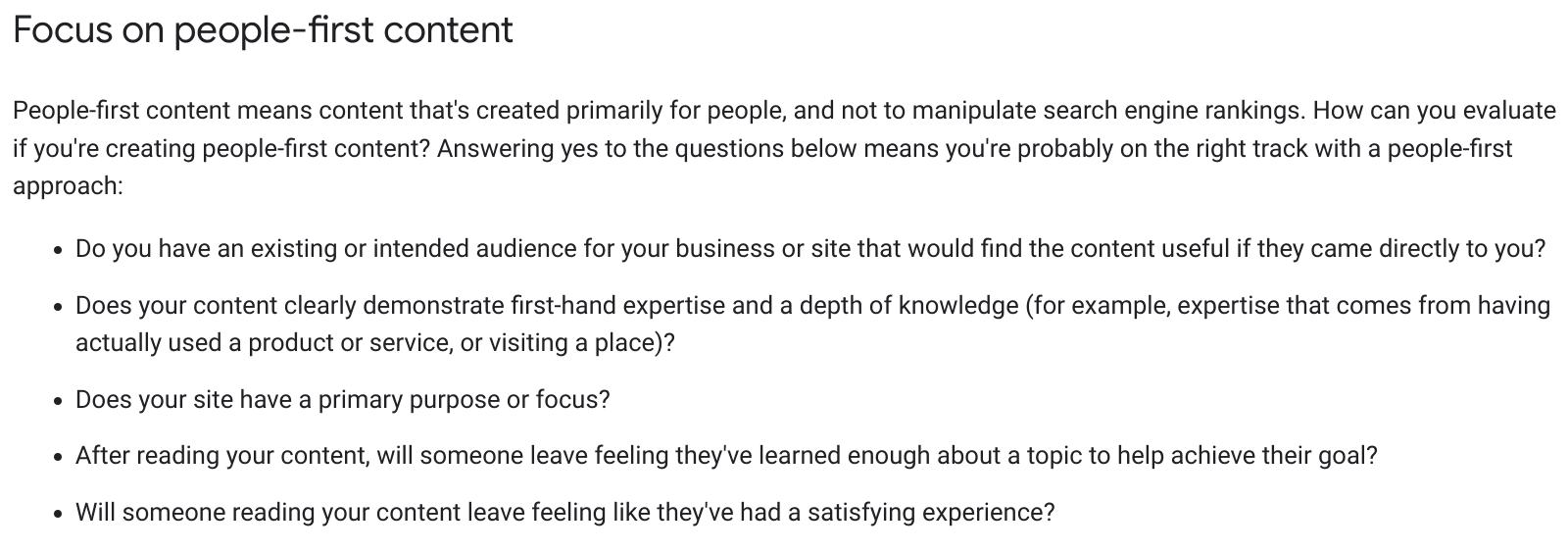AI is causing a mass panic for SEOs. Not only is it changing the face of SEO, but it’s inserting itself as an alternative to workers. However, long-form content has the power to overturn this threat and is the perfect way to adapt to the change.
But why should deep content be prioritised over shallow content? Well, let’s put it simply. What happens when you jump into a shallow pool? You hit rock bottom. But what about when you jump into the deep end? You’re given room to swim. This is just what happens with your content. Deep content benefits your SEO and gives you room for ranking opportunities, and your site overall is given room to grow and creep up the SERP rankings. By choosing to add more long-form content, you’re suiting both what Google wants and the user’s needs.
Short-form content vs long-form content

The difference is in the name, really. Short-form (shallow) content is content with a lack of detail, and description and is often created quickly with a desire for short-term outcomes. This makes it shallow and is often what AI produces. It doesn’t really go beyond the surface, and because of its speedy nature, this content is sometimes churned out at rapid speed for short-term traffic.
On the other hand, long-form (deep) content does what it says on the tin- it goes deeper. It takes time and effort to create, but this is rewarded with a strong site that performs better in the long term and ranks highly. You want this content to reflect your skills as a brand, so it normally appears well-crafted and answers everything a user wants to know. If it does this, then it removes the threat of AI to its role.
Reasons why deep content is better for your SEO
Let’s take a deeper look (see what we did there?) into the actual reasons why long-form content is better for your SEO. Here are three main reasons that you should definitely implement it into your strategy:
The threat of AI
As mentioned previously, AI is beginning to adapt to answer the user’s questions and is stealing traffic that should otherwise be on your site. It’s coming after deep topics that your site should be writing about. Keyword research can help you decide what these topics are so you can write about them with lots of detail. Writing high-quality, long-form content demonstrates the type of expertise that AI doesn’t have.
Google’s response to content
Google itself loves deep content, so it’s only natural that it will reward this practice. You have more freedom and wriggle room with long-form content to make it engaging and move past just the ‘facts’. If you fulfill a user’s intent in depth and detail, Google will certainly reward you as it helps them recognise E-E-A-T. Deep content isn’t just about writing lots of words though. Their algorithms read your content and if yours proves most useful and has the highest quality, you’ll be ranked highly. Google rewards ‘people-first content‘, and you can see what this means below:

Link opportunities
Despite the introduction of AI, earning backlinks still contributes to how Google ranks you. And short-form content will struggle to achieve backlinks as it’s only so far it can go and only so much detail it can include. Achieving more backlinks then improves your SEO. A backlink signals that your site is authoritative and trustworthy- Google wants to provide a good user experience, so the more backlinks you get, the more relevant you appear.
Take a look at Shona Worsman, our Senior Content Manager, explaining what long-form content is and why it’s important:
Creating deep content
Let’s have a look how you actually get the ball rolling for creating this type of content. It may seem quite daunting at first if all you’re used to is quick, snappy content that only covers surface-level stuff. Hopefully, these tips should get you going:
Think topically
Not every topic can be transformed into a long-form piece. Some topics are better left as short-form, and that’s fine! So thinking topically helps you target those areas that will benefit from having long-form content and even topics that are trending.
Sometimes the piece might form as part of a topic cluster, or it might be something that you know is complex and needs an in-depth blog about it. If you know a general overview won’t quite cut it, then it will probably work as a deep piece of content.
Consider its structure
Using the correct headings (H1 for your title, H2s for subtitles, H3s for sub-points to the H2, and H4s for sub-points to the H3) helps a user know where they are in each section, therefore making navigation much easier.
Perhaps forming an outline so you have a guide of what to talk about will help you structure your content- breaking it up into readable chunks makes it SEO-friendly and prevents the reader from being bored by streams of endless writing.
User intent
Why has the user searched for this topic? Get in their heads and think about what they really want to take away from your piece. You want to give them all the information they need to fully understand the topic at hand, right? Otherwise, they may just find another source of information and spend less valuable time on your page.
You want to be the main source of information on your chosen topic to rank against competitors and let users get everything they want from it.
Key takeaways
Google loves deep content, and it will greatly benefit your SEO. By leaning into this type of content, you open up your ranking opportunities and are more likely to cover the user’s needs. Choose topics that you can say a lot about- say something valuable instead of trying to meet a word count.
Ready to start writing deep content? If you’re still unsure, our helpful team of experts who produce high-quality SEO content will be able to help you. We know just how to capture your brand’s voice and how to optimise long-form content so it ranks highly. Feel free to get in touch today!














